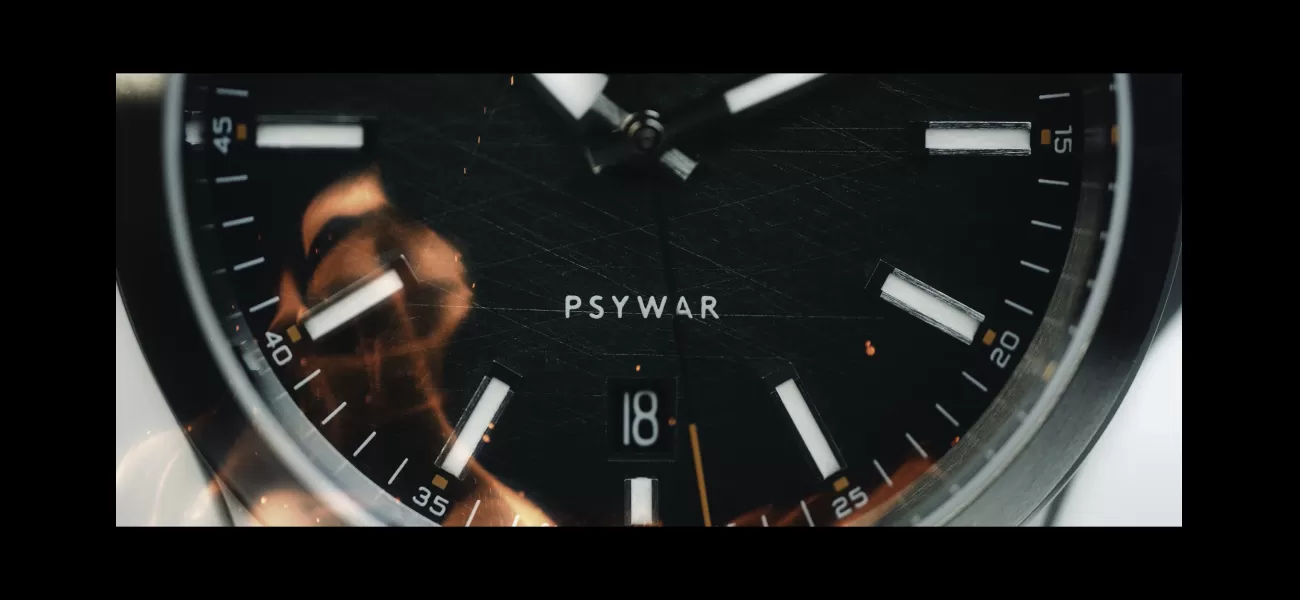New US Army video to attract recruits for psychological operations is eerily captivating.
The unsettling video includes faceless people, fire, and soldiers.
May 3rd 2024.

The video left me feeling uneasy, as it was filled with haunting images of faceless individuals, fire, and soldiers. The voiceover was a mesmerizing mix of familiar historical voices, while the screen pulsed with enigmatic messages promoting the power of words, ideas, and "invisible hands." As the frames flashed by, I caught glimpses of its origin: PSYWAR.
Curiosity piqued, I delved further into the video's origins and discovered that it was created by the US Army's psychological warfare soldiers. Their aim? To attract new recruits to join their ranks. And if the video captivates you, you may very well be their target audience as they strive to enlist soldiers for their Special Operations Command.
The video, titled "Ghost in the Machine 2," was released in the wee hours of Thursday morning. It is a follow-up to the first thought-provoking recruiting ad that caused quite a stir when it was quietly uploaded to the unit's YouTube page two years ago. And now, it's back with a vengeance, exemplifying the type of work that the psyop soldiers undertake to sway public opinion and wage the war of words on foreign soil.
According to the Army major who spearheaded the video's creation, it is, in essence, a recruiting tool. He explained in an interview with The Associated Press before its release that they were looking for individuals who would watch the video and think, "Wow, that was effective. How was it constructed?" This, he said, is the type of creative mindset they seek in potential recruits.
The major, who is a member of the 8th Psychological Operations Group stationed at Fort Liberty, North Carolina, has also created the first video. However, he requested to remain anonymous, as is customary for special forces personnel. Psyop units have a wide range of missions, from simple leaflet drops to sophisticated propaganda and messaging to deceive the enemy or shape opinions in foreign countries. It is essential to note that it is illegal for the US military to conduct psychological operations on American citizens.
Leaders in the Army Special Operations Command and special forces recruiters are hoping that the video will spark conversations that will, in turn, attract new recruits to this little-known and often unseen job. Lieutenant Colonel Steve Crowe, the commander of the Special Forces Recruiting Battalion, stated that showcasing the psyop mission at a tactical level is quite challenging. This, he believes, is one of the reasons why it is the toughest job in Army special forces to fill.
The military, as a whole, has been struggling to meet its recruitment goals in recent years, with the majority falling far short of their targets. The Army, being the most substantial branch, has had the most trouble, falling short of its goal by approximately 15,000 soldiers for two consecutive years. However, this year, things seem to be looking up for most branches. Special Operations recruiters in the Army report that they are making about 75% of their overall goal, which translates to approximately 3,000 to 4,000 recruits. Out of that, they need to bring in around 650 active-duty soldiers for psychological operations annually.
Officials cite several factors for the challenges in recruiting, including low unemployment rates, competition from well-paying corporate jobs with similar benefits, and the slow recovery from COVID-19 pandemic restrictions that prevented recruiters from visiting schools and attending public events. The struggles in recruiting for Army Special Operations Command mirror those of the larger Army.
The recruiters are responsible for attracting various types of special forces, including the well-known Green Berets and Delta Force, as well as Civil Affairs, Psychological Operations, and the 160th Special Operations Aviation Regiment, also known as the Night Stalkers. Despite the Army's plans to downsize the number of psyop soldiers, they continue to struggle to fill their ranks.
One of the most renowned psychological operations in history was carried out by the US Ghost Army during World War II. Using inflatable tanks, radio deception, costumes, and impersonations, they outsmarted the Germans. During Operation Viersen, they employed these tactics to lure German units away from the actual crossing point on the Rhine River where the 9th Army was making its way across. Recently, some of the last surviving members of the unit were recognized for their bravery and awarded the Congressional Gold Medal at a ceremony in Washington.
The video is quite unsettling, to say the least. It's filled with eerie images of people without faces, fires blazing, and soldiers marching. As the screen flickers with cryptic messages, a voiceover can be heard in the background. It's a mix of familiar historical voices, and it's speaking about the power of words, ideas, and something called "invisible hands." As the video continues, little clues about its origins are revealed in quick flashes: PSYWAR.
The video has caught the attention of many, and for good reason. It turns out that it's a recruitment ad for the US Army's psychological warfare soldiers. These skilled soldiers are using their unique abilities to bring in new recruits for the Army's Special Operations Command. And if you find the video intriguing, you may just be the target audience they're looking for.
The video, titled "Ghost in the Machine 2," was released in the early hours of Thursday. It's actually the second ad of its kind, with the first one causing quite a stir when it was quietly posted on the unit's YouTube page two years ago. The Army major who created the video, who spoke with The Associated Press before its release, made it clear that it was a recruitment ad. But it's not just about recruiting new soldiers - it's also a showcase of the creative mindset that the Army is looking for in its recruits.
The soldier who created the video is a member of the 8th Psychological Operations Group, based at Fort Liberty, North Carolina. Like many special forces troops, he prefers to remain anonymous. This is especially important in the world of psychological operations, where secrecy and deception are key elements of their missions. These soldiers are trained to use various tactics, from simple leaflet drops to more sophisticated propaganda techniques, to deceive the enemy and influence public opinion in foreign countries.
It's important to note that it's illegal for the US military to conduct psychological operations on American citizens. However, Army Special Operations Command leaders and recruiters are hoping that the video will generate enough buzz to bring in new recruits for this little-known job. Lieutenant Colonel Steve Crowe, commander of the Special Forces Recruiting Battalion, acknowledges that it's difficult to showcase the psyop mission, but he believes that the video will help to attract potential recruits.
Recruiting for psychological operations is particularly challenging. Across all branches of the military, enlistment goals have been difficult to meet in recent years. The Army, being the largest branch, has had the most trouble, falling short of its goal by 15,000 soldiers for the past two years. However, there are signs of improvement this year. Army Special Operations recruiters, who focus on recruiting from active-duty soldiers, have met 75% of their overall goal, which is between 3,000 and 4,000 soldiers. They are specifically looking to bring in about 650 soldiers for psychological operations each year.
There are several reasons why recruiting has been difficult in recent years. The nation's low unemployment rate means that there is more competition from corporate businesses, which can offer better pay and benefits. The COVID-19 pandemic has also played a role, as recruiters were unable to visit schools and attend public events to meet potential recruits. This has been especially challenging for the Army Special Operations Command, whose recruiting struggles mirror those of the larger Army.
The recruiters are responsible for bringing in soldiers for various special forces units, including the Green Berets, Delta Force, Civil Affairs, Psychological Operations, and the 160th Special Operations Aviation Regiment (also known as the Night Stalkers). Despite the Army's plans to reduce the number of psyop soldiers, they are still struggling to fill their ranks. However, the Army has a history of using psychological operations in warfare, with one of the most famous examples being the "Ghost Army" in World War II. This unit used inflatable tanks, radio trickery, and other deceptive tactics to outwit the Germans and help the 9th Army successfully cross the Rhine River.
Recently, several members of the Ghost Army were awarded the Congressional Gold Medal for their brave actions. It's a reminder of the important role that psychological operations have played in military history, and the crucial role they continue to play in shaping public opinion and influencing the enemy.
Curiosity piqued, I delved further into the video's origins and discovered that it was created by the US Army's psychological warfare soldiers. Their aim? To attract new recruits to join their ranks. And if the video captivates you, you may very well be their target audience as they strive to enlist soldiers for their Special Operations Command.
The video, titled "Ghost in the Machine 2," was released in the wee hours of Thursday morning. It is a follow-up to the first thought-provoking recruiting ad that caused quite a stir when it was quietly uploaded to the unit's YouTube page two years ago. And now, it's back with a vengeance, exemplifying the type of work that the psyop soldiers undertake to sway public opinion and wage the war of words on foreign soil.
According to the Army major who spearheaded the video's creation, it is, in essence, a recruiting tool. He explained in an interview with The Associated Press before its release that they were looking for individuals who would watch the video and think, "Wow, that was effective. How was it constructed?" This, he said, is the type of creative mindset they seek in potential recruits.
The major, who is a member of the 8th Psychological Operations Group stationed at Fort Liberty, North Carolina, has also created the first video. However, he requested to remain anonymous, as is customary for special forces personnel. Psyop units have a wide range of missions, from simple leaflet drops to sophisticated propaganda and messaging to deceive the enemy or shape opinions in foreign countries. It is essential to note that it is illegal for the US military to conduct psychological operations on American citizens.
Leaders in the Army Special Operations Command and special forces recruiters are hoping that the video will spark conversations that will, in turn, attract new recruits to this little-known and often unseen job. Lieutenant Colonel Steve Crowe, the commander of the Special Forces Recruiting Battalion, stated that showcasing the psyop mission at a tactical level is quite challenging. This, he believes, is one of the reasons why it is the toughest job in Army special forces to fill.
The military, as a whole, has been struggling to meet its recruitment goals in recent years, with the majority falling far short of their targets. The Army, being the most substantial branch, has had the most trouble, falling short of its goal by approximately 15,000 soldiers for two consecutive years. However, this year, things seem to be looking up for most branches. Special Operations recruiters in the Army report that they are making about 75% of their overall goal, which translates to approximately 3,000 to 4,000 recruits. Out of that, they need to bring in around 650 active-duty soldiers for psychological operations annually.
Officials cite several factors for the challenges in recruiting, including low unemployment rates, competition from well-paying corporate jobs with similar benefits, and the slow recovery from COVID-19 pandemic restrictions that prevented recruiters from visiting schools and attending public events. The struggles in recruiting for Army Special Operations Command mirror those of the larger Army.
The recruiters are responsible for attracting various types of special forces, including the well-known Green Berets and Delta Force, as well as Civil Affairs, Psychological Operations, and the 160th Special Operations Aviation Regiment, also known as the Night Stalkers. Despite the Army's plans to downsize the number of psyop soldiers, they continue to struggle to fill their ranks.
One of the most renowned psychological operations in history was carried out by the US Ghost Army during World War II. Using inflatable tanks, radio deception, costumes, and impersonations, they outsmarted the Germans. During Operation Viersen, they employed these tactics to lure German units away from the actual crossing point on the Rhine River where the 9th Army was making its way across. Recently, some of the last surviving members of the unit were recognized for their bravery and awarded the Congressional Gold Medal at a ceremony in Washington.
The video is quite unsettling, to say the least. It's filled with eerie images of people without faces, fires blazing, and soldiers marching. As the screen flickers with cryptic messages, a voiceover can be heard in the background. It's a mix of familiar historical voices, and it's speaking about the power of words, ideas, and something called "invisible hands." As the video continues, little clues about its origins are revealed in quick flashes: PSYWAR.
The video has caught the attention of many, and for good reason. It turns out that it's a recruitment ad for the US Army's psychological warfare soldiers. These skilled soldiers are using their unique abilities to bring in new recruits for the Army's Special Operations Command. And if you find the video intriguing, you may just be the target audience they're looking for.
The video, titled "Ghost in the Machine 2," was released in the early hours of Thursday. It's actually the second ad of its kind, with the first one causing quite a stir when it was quietly posted on the unit's YouTube page two years ago. The Army major who created the video, who spoke with The Associated Press before its release, made it clear that it was a recruitment ad. But it's not just about recruiting new soldiers - it's also a showcase of the creative mindset that the Army is looking for in its recruits.
The soldier who created the video is a member of the 8th Psychological Operations Group, based at Fort Liberty, North Carolina. Like many special forces troops, he prefers to remain anonymous. This is especially important in the world of psychological operations, where secrecy and deception are key elements of their missions. These soldiers are trained to use various tactics, from simple leaflet drops to more sophisticated propaganda techniques, to deceive the enemy and influence public opinion in foreign countries.
It's important to note that it's illegal for the US military to conduct psychological operations on American citizens. However, Army Special Operations Command leaders and recruiters are hoping that the video will generate enough buzz to bring in new recruits for this little-known job. Lieutenant Colonel Steve Crowe, commander of the Special Forces Recruiting Battalion, acknowledges that it's difficult to showcase the psyop mission, but he believes that the video will help to attract potential recruits.
Recruiting for psychological operations is particularly challenging. Across all branches of the military, enlistment goals have been difficult to meet in recent years. The Army, being the largest branch, has had the most trouble, falling short of its goal by 15,000 soldiers for the past two years. However, there are signs of improvement this year. Army Special Operations recruiters, who focus on recruiting from active-duty soldiers, have met 75% of their overall goal, which is between 3,000 and 4,000 soldiers. They are specifically looking to bring in about 650 soldiers for psychological operations each year.
There are several reasons why recruiting has been difficult in recent years. The nation's low unemployment rate means that there is more competition from corporate businesses, which can offer better pay and benefits. The COVID-19 pandemic has also played a role, as recruiters were unable to visit schools and attend public events to meet potential recruits. This has been especially challenging for the Army Special Operations Command, whose recruiting struggles mirror those of the larger Army.
The recruiters are responsible for bringing in soldiers for various special forces units, including the Green Berets, Delta Force, Civil Affairs, Psychological Operations, and the 160th Special Operations Aviation Regiment (also known as the Night Stalkers). Despite the Army's plans to reduce the number of psyop soldiers, they are still struggling to fill their ranks. However, the Army has a history of using psychological operations in warfare, with one of the most famous examples being the "Ghost Army" in World War II. This unit used inflatable tanks, radio trickery, and other deceptive tactics to outwit the Germans and help the 9th Army successfully cross the Rhine River.
Recently, several members of the Ghost Army were awarded the Congressional Gold Medal for their brave actions. It's a reminder of the important role that psychological operations have played in military history, and the crucial role they continue to play in shaping public opinion and influencing the enemy.
[This article has been trending online recently and has been generated with AI. Your feed is customized.]
[Generative AI is experimental.]
0
0
Submit Comment





